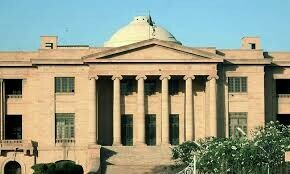KARACHI: One of the nine members of the newly formed constitutional bench of the Sindh High Court has recused himself from becoming part of it, arguing that the Judicial Commission of Pakistan (JCP) should have constituted the bench on a seniority basis.
Had he not opted to recuse, Justice Omar Sial would also have been part of a three-member committee that decides fixation of cases before the SHC constitutional bench.
He informed the head of the constitutional bench, Justice Muhammad Karim Khan Agha, through a letter that whether one wishes to be a bench member or not remains a judge’s prerogative.
Informed sources told Dawn that Justice Sial opined in his letter that every judge of the SHC would have been assigned the task of addressing constitutional violations and if it was not possible, the selection of judges for these benches should be seniority-driven unless there were reasons for not doing so.
On Nov 25, the JCP had established the nine-member constitutional bench for SHC, headed by Justice Agha under the 26th Amendment.
Writes to Justice Agha, says JCP should have considered selection of judges on basis of seniority
Justice Agha is at number nine on the seniority list of SHC judges, while Justice Mohammad Salim Jessar, Justice Sial, Justice Yousaf Ali Sayeed, Justice Abdul Mobeen Lakho, Justice Zulfikar Ali Sangi, Justice Sana Akram Minhas, Justice Khadim Hussain Soomro and Justice Arbab Ali Hakro, who were named as members of the constitutional bench, are at serial numbers 12, 14, 16, 21, 22, 24, 26 and 28 on the seniority list of SHC judges, respectively.
This indicates as many as eight senior judges, including SHC Chief Justice Mohammad Shafi Siddiqui, senior puisne judge Justice Naimatullah Phulpoto, Justice Salahuddin Panhwar, Justice Mohammad Junaid Ghaffar, Justice Zafar Ahmed Rajput, Justice Mohammad Iqbal Kalhoro, Justice Zulfiqar Ahmad Khan and Justice Mahmood A. Khan, have been ignored or superseded by the commission while considering the names for the constitutional bench.
Currently, the SHC is functioning with 28 judges against a sanctioned strength of 40.
Around 96,000 cases, including 36,000 constitutional petitions, have been pending before the SHC.
Of them, nearly 22,000 constitutional petitions are pending at its principal seat in Karachi and around 14,000 at different benches in other parts of the province.
‘CJ knows his judges best’
Justice Sial, in his letter, also mentioned that his senior colleagues in the commission and SHC chief justice had disagreed with the nominations made for the SHC constitutional bench, and he appreciated that their “dissent was not person-specific but a matter of principle”.
In their point of view, the judge maintained, some senior judges would better sit on benches dealing with cases assigned to the constitutional bench with their experience, knowledge, and wisdom. In this regard, the wisdom of SHC chief justice was best positioned to decide which judge should be on which bench, he said, adding that the chief justice of a province knew his judges best.
When a substantial majority of the members of JCP from the executive become instrumental in forming benches, rightly or wrongly, a dangerous perception is created about interference by executive in the judiciary, which erodes the very fabric of democracy, the letter pointed out.
After passage of the 26th Amendment, Sindh was the first, and so far the only province, where the provincial assembly had adopted a resolution for the creation of constitutional benches in the high court.
Earlier on Nov 8, the JCP had endorsed a proposal of the SHC chief justice that all the existing high court judges were nominated to be the judges of constitutional benches to clear the backlog of cases, and such arrangement had remained effective till Nov 24.
Published in Dawn, November 27th, 2024







